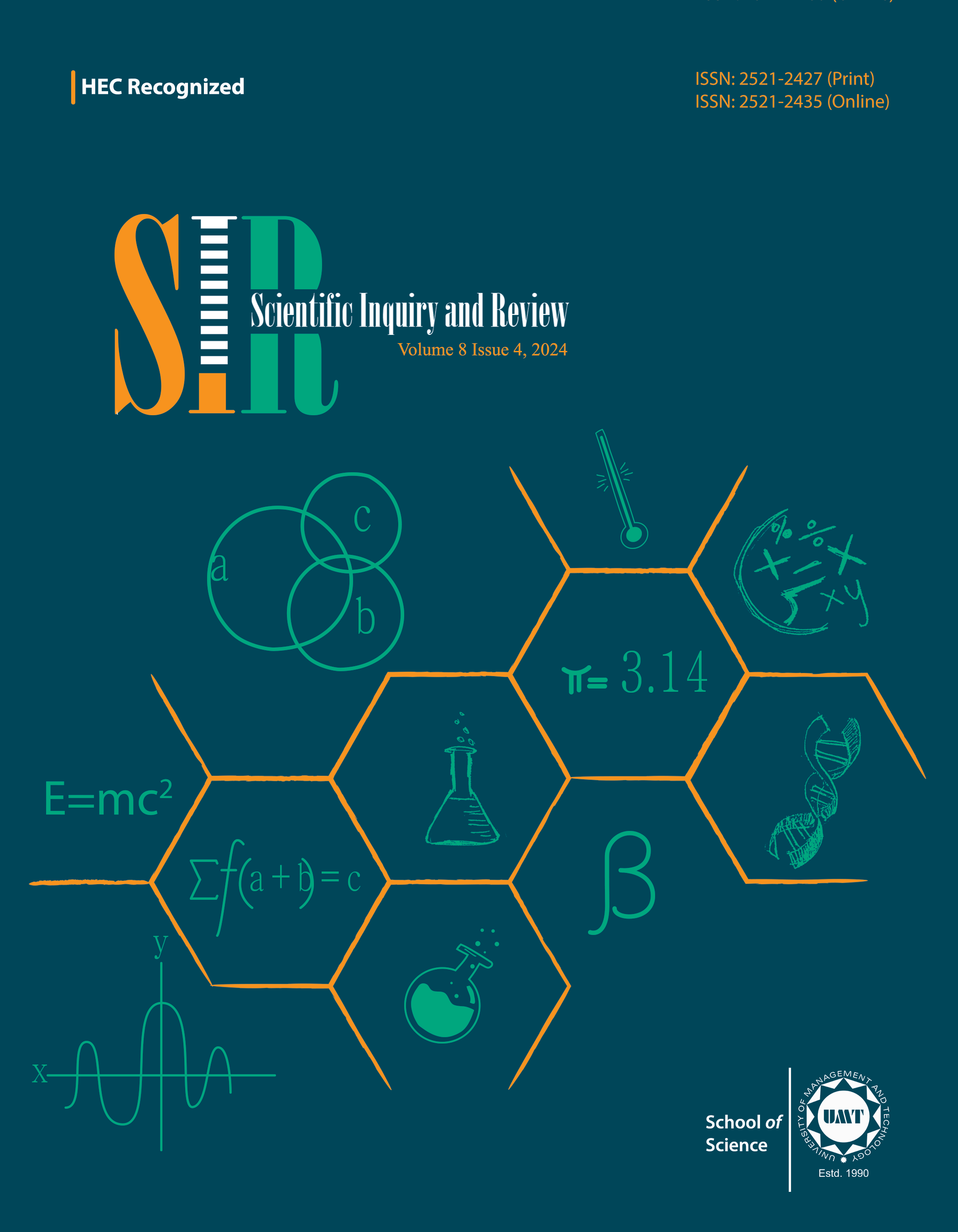On the Study of Topological Indices of Drugs against COVID-19
Abstract
 Abstract Views: 0
Abstract Views: 0
A topological index (TI) is an analytical metric of the molecular structure derived from the corresponding molecular graph. A class of viruses known as coronaviruses is responsible for human upper respiratory tract infections. Several antiviral medications currently available in the market are efficient in managing COVID-19. These include ritonavir, arbidol, theaflavin, hydroxychloroquine, chloroquine, and remdesivir (GS-5734). In this study, a set of TIs for remdesivir (GS-5734), arbidol, theaflavin, ritonavir, chloroquine, and hydroxychloroquine are computed based on their repective molecular graphs. These indices comprise Nirmala leap index, modified Nirmala leap index, first inverse Nirmala index, and second inverse Nirmala index. Additionally, the calculated outcomes are plotted to see how they are affected by the relevant parameters. The analysis shows that the Nirmala leap index shows the highest value among the studied indices, with Ritonavir leading at . Conversely, the modified Nirmala leap index shows the lowest value of for chloroquine. These findings may offer assistance in the advancement of novel COVID-19 treatment drugs.
Downloads
References
Huang C, Wang Y, Li X, et al. Clinical features of patients infected with 2019 novel coronavirus in Wuhan, China. Lancet. 2020;395(10223):497–506. https://doi.org/10.1016/S0140-6736(20)30183-5
Zhou D, Dai SM, Tong Q. COVID-19: a recommendation to examine the effect of hydroxychloroquine in preventing infection and progression. J Antimicro Chemother. 2020;75(7):1667–1670. https://doi.org/10.1093/jac/dkaa114
Morse JS, Lalonde T, Xu S, Liu WR. Learning from the past: possible urgent prevention and treatment options for severe acute respiratory infections caused by 2019‐nCoV. Chembiochem. 2020;21(5):730–738. https://doi.org/10.1002/cbic.202000047
Lung J, Lin YS, Yang YH, et al. The potential chemical structure of anti‐SARS‐CoV‐2 RNA‐dependent RNA polymerase. J Med Virol. 2020;92(6):693–697. https://doi.org/10.1002/jmv.25761
Wang M, Cao R, Zhang L, et al. Remdesivir and chloroquine effectively inhibit the recently emerged novel coronavirus (2019-nCoV) in vitro. Cell Res. 2020;30(3):269–271. https://doi.org/10.1038/s41422-020-0282-0
Xu X, Chen P, Wang J, et al. Evolution of the novel coronavirus from the ongoing Wuhan outbreak and modeling of its spike protein for risk of human transmission. Sci China Life Sci. 2020;63:457–460. https://doi.org/10.1007/s11427-020-1637-5
Farman M, Akgül A, Nisar KS, et al. Epidemiological analysis of fractional order COVID-19 model with Mittag-Leffler kernel. AIMS Math. 2022:7(1):756–783. https://doi.org/10.3934/math.2022046
Warren TK, Jordan R, Lo MK, et al. Therapeutic efficacy of the small molecule GS-5734 against Ebola virus in rhesus monkeys. Nature. 2016;531(7594):381–385. https://doi.org/10.1038/nature17180
Hu M, Ali H, Binyamin MA, Ali B, Liu JB, Fan C. On distance‐based topological descriptors of chemical interconnection networks. J Math. 2021;2021(1):e5520619. https://doi.org/10.1155/2021/5520619
Savarino A, Di Trani L, Donatelli I, Cauda R, Cassone A. New insights into the antiviral effects of chloroquine. Lancet Infect Dis. 2006;6(2):67–69. https://doi.org/10.1016/s1473-3099(06)70361-9
Yan Y, Zou Z, Sun Y, et al. Anti-malaria drug chloroquine is highly effective in treating avian influenza A H5N1 virus infection in an animal model. Cell Res. 2013;23(2):300–302. https://doi.org/10.1038/cr.2012.165
Khan A, Zarin R, Humphries UW, Akgül A, Saeed A, Gul T. Fractional optimal control of COVID-19 pandemic model with generalized Mittag-Leffler function. Adv Difference Equat. 2021;2021:1–22. https://doi.org/10.1186/s13662-021-03546-y
Amin M, Farman M, Akgül A, Alqahtani RT. Effect of vaccination to control COVID-19 with fractal fractional operator. Alexand Eng J. 2022;61(5):3551–3557. https://doi.org/10.1016/j.aej.2021.09.006
Azeem M, Aslam A, Iqbal Z, Binyamin MA, Gao W. Topological aspects of 2D structures of trans-Pd (NH2) S lattice and a metal-organic superlattice. Arab J Chem. 2021;14(3):e102963. https://doi.org/10.1016/j.arabjc.2020.102963
Chowdhury P, Sahuc ME, Rouillé Y, et al. Theaflavins, polyphenols of black tea, inhibit entry of hepatitis C virus in cell culture. PLoS One. 2018;13(11):e0198226. https://doi.org/10.1371/journal.pone.0198226
Yang ZF, Bai LP, Huang WB, et al. Comparison of in vitro antiviral activity of tea polyphenols against influenza A and B viruses and structure–activity relationship analysis. Fitoterapia. 2014;93:47–53. https://doi.org/10.1016/j.fitote.2013.12.011
Wiener H. Structural determination of paraffin boiling points. J Am Chem Soc. 1947;69(1):17–20. https://doi.org/10.1021/ja01193a005
Gutman I, Polansky OE. Mathematical Concepts in Organic Chemistry. Springer Science & Business Media; 2012. https://doi.org/10.1007/978-3-642-70982-1
Trinajstic N. Chemical Graph Theory. CRC Press; 2018. https://doi.org/10.1201/9781315139111
Kulli VR. Nirmala index. Int J Math Trends Technol. 2021;67(3):eIJMTT-V67I3P502. https://doi.org/10.14445/22315373/IJMTT-V67I3P502
Basak SC, Niemi GJ, Veith GD. Predicting properties of molecules using graph invariants. J Math Chem. 1991;7(1):243–272. https://doi.org/10.1007/BF01200826
Dai YM, Zhu ZP, Cao Z, Zhang YF, Zeng JL, Li X. Prediction of boiling points of organic compounds by QSPR tools. J Molecul Graph Model. 2013;44:113–119. https://doi.org/10.1016/j.jmgm.2013.04.007
Amin S, Rehman MA, Farahani MR, Cancan M, Aldemir MS. Multiplicative degree-based topological indices and line graph of hex board graph. Eurasian Chem Commun. 2020;2(11):1137–1145. https://doi.org/10.22034/ecc.2020.255142.1093
Amin S, Rehman MA, Farahani MR, Cancan M, Aldemir MS. M-polynomial and degree-based topological indices and line graph of hex board graph. Eurasian Chem Commun. 2020;2(12):1156–1163. https://doi.org/10.22034/ecc.2020.255143.1094
Amin S, Rehman Virk AU, Rehman MA, Shah NA. Analysis of dendrimer generation by Sombor indices. J Chem. 2021;2021(1):e9930645. https://doi.org/10.1155/2021/9930645
Gutman I, Kulli VR. Nirmala energy. Open J Disc Appl Math. 2021;4(2):11–16.
Kulli VR, Gutman I. On some mathematical properties of Nirmala index. Ann Pure Appl Math. 2021;23(2):93–99. https://doi.org/10.22457/apam.v23n2a06822
Kulli VR, Harish N, Chaluvaraju B. Sombor leap indices of some chemical drugs. RES Rev Int J Multidiscip. 2022;7(10):158–166. https://doi.org/10.31305/rrijm.2022.v07.i10.019
Kulli VR. Different versions of Nirmala index of certain chemical structures. Int J Math Trends Technol. 2021;67(7):eIJMTT-V67I7P507. https://doi.org/10.14445/22315373/IJMTT-V67I7P507
Kulli VR, Lokesha V, Nirupadi K. Computation of inverse Nirmala indices of certain nanostructures. Int J Math Combin. 2021;2:33–40. https://doi.org/10.22457/apam.v23n2a02821
Copyright (c) 2024 Bushra Nadeem, Muazzam Ali, M U Hashmi, Abdul Manan; Bagh Ali, Sidra Siddiqui

This work is licensed under a Creative Commons Attribution 4.0 International License.







